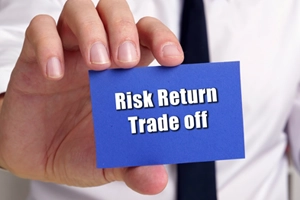
According to Newton's Third Law of Motion, for every action, there is an equal and opposite reaction. You can see this principle play out in many areas of life, including your investments. In mutual funds, this concept is represented by the risk-return trade-off. But how exactly does this work in the world of investing? Let's find out.
What is the concept of risk in mutual funds?
All mutual funds are subject to market risk. This implies the value of your investment in a mutual fund scheme can fluctuate over time. While there are strategies to manage and reduce risk, some level of risk is always present.
The degree of risk can vary across different types of mutual fund schemes. Equity funds generally carry the highest risk, followed by hybrid funds and then debt funds. Even within these categories, the risk can differ. For instance, within equity funds, large-cap funds are typically less risky than small-cap funds.
What is the risk and return trade-off in mutual funds?
The risk-return trade-off is the concept that higher risk in an investment usually comes with the potential for higher returns, while lower-risk investments typically offer lower returns. This principle helps you decide whether taking a certain level of risk is worthwhile based on the potential rewards.
For example, equity mutual funds carry a higher level of risk due to market volatility. However, if you choose a well-performing equity fund with strong potential returns, the risk you take might be justified by the gains you may earn over time.
Understanding the importance of risk-return trade-off in mutual funds
Here's why the risk-return trade-off is important when investing in mutual funds:
- Helps you analyse the risk and return associated with different schemes: The risk-return trade-off helps you evaluate both the level of risk associated with a mutual fund and the potential returns it can offer. It plays an integral role in helping you decide on suitable investments and determining whether a fund is worth the risk.
- Helps you align your risk appetite with your investments: It enables you to match your risk appetite with the appropriate type of mutual fund. For instance, if you have a high-risk tolerance, you may opt for funds with greater volatility but higher return potential, such as small-cap, thematic, or sectoral funds. On the other hand, if you prefer to play it safe, you might opt for low-risk options, such as liquid funds.
- Helps you diversify your mutual fund portfolio: Understanding the risk-return trade-off helps you build a diversified portfolio of different funds. You can balance your investments across funds with varying levels of risk and return and create a portfolio that suits your financial goals and comfort with risk.
How do you balance risk and return in your portfolio?
Here are some tips that can help you balance risk and return in your portfolio:
- Diversify your portfolio: It is important not to put all your eggs in one basket. You can combine high-risk investments, such as equity mutual funds, with more stable options, like debt or hybrid funds. This allows your portfolio to grow so you can achieve your goals. At the same time, it also offers a cushion against market volatility.
- Invest for the long term: Long-term investing allows your money to compound, as your returns are reinvested in the market to generate more earnings. Over time, this can potentially amplify your gains. It also helps you ride out short-term market fluctuations and reduces the impact of temporary losses.
- Do your research before investing: Always understand the level of risk associated with any mutual fund before you invest. You must read the scheme documents to understand the risk it carries, check the fund's past performance, and evaluate if it fits your financial goals and risk appetite.
Conclusion
The risk-return trade-off in mutual funds can help you evaluate both the potential risks and expected returns of an investment. It can help you make better decisions while allowing you to align your investments with your financial goals and risk appetite. It also plays a key role in diversifying your portfolio.
An investor education initiative by Edelweiss Mutual Fund
All Mutual Fund Investors have to go through a one-time KYC process. Investors should deal only with Registered Mutual Fund (RMF). For more info on KYC, RMF and procedure to lodge/redress any complaints, visit - https://www.edelweissmf.com/kyc-norms
MUTUAL FUND INVESTMENTS ARE SUBJECT TO MARKET RISKS. READ ALL SCHEME-RELATED DOCUMENTS CAREFULLY
Trending Articles
MUTUAL FUND INVESTMENTS ARE SUBJECT TO MARKET RISKS, READ ALL SCHEME RELATED DOCUMENTS CAREFULLY.















